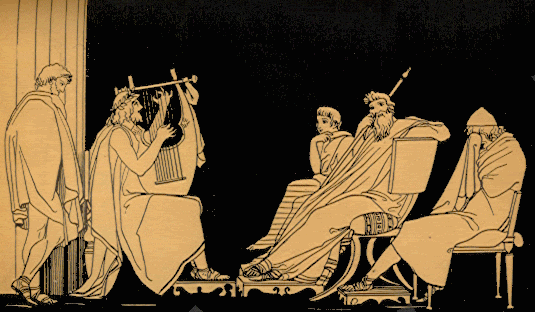
(I’m picking up here directly from the previous post in this series, so if you didn’t catch that one, you might want to skim it before continuing.)
Odysseus, who decides how the story is going to unfold. and Demodocus, who implements that decision, together are analogous to the gamer. Together they represent, in fact, a kind of impossible, ideal perfection of the relationship between bard and audience, wherein the audience knows exactly what they want, and the bard is capable of giving them precisely that. Impossibly until now, that is, for in narrative video games players get to do the fun parts of the bard’s job and get to be the bard’s audience, recipients of the product of the immense techincal skill required to make a game, analogous to the technical skill it took to sing the Odyssey.
There are, however, two crucial remainders from this quotient. First, game-developers are stuck with the difficult, if more rewarding (both spiritually and financially), part of the bard’s job—the use of masterly technical skill to create a mythic backdrop with which to interact to create the story. Second, other people, not playing the game (at that moment, at least), like the listening Phaeacian audience either watch the gamer play the game or hear about his amazing feats later.
They may seem trivial at first, but those two remainders actually are for me the salvation of gaming from the appearance it presents of a basic anti-sociality. Indeed, I think that the communal relationship between developers, gamers, and other gamers (as well as non-gamers like parents and spouses) will in the end bring the mainstream around much more than games like Rock Band and Wii Sports ever could. As much as those great social games of today, and others like them, get played at parties, giving gamers and game companies the opportunity to point to an obviously social practice, I think that only a fuller understanding of what individual gamers are doing in community when they play Shadow of the Colossus or Fallout (or Bioshock or Halo) will demonstrate how social gaming actually is.
The relationship with the game-makers, and the relationship with the other people who aren’t playing on a given occasion but with whom the gamer shares the experience are founded, I’ll show as this mini-series continues, in the experience of immersion. Those relationships, I believe, make gaming a true successor to the ancient epic tradition that played an indispensable part in making our civilization great.
The game-makers, like the bards, have immense technical skill. They know the nuts and bolts of storytelling in their medium backwards and forwards. It doesn’t make the slightest difference that while the ancient bards knew dactylic hexameter, modern developers know anti-aliasing, or C#. That means of course that I’ve been fudging my comparison to this point, leaving the programmers out of it. But I don’t have to fudge anymore: the developer gets his or her glory as another kind of successor to the bard.
The people who watch a gamer game, or read his or her posts on the internet, are exactly like the admiring audience of the bard—the community that bard and other bards form as they tell wonderful, immersive tales. I think if we want to make the comparison come out as well as it can, we should imagine one bard singing to an audience of fellow-bards, because most of the time the gamer is performing for an audience of fellow-gamers. There is much to talk about on this topic, but for now let me point to the communities like Bungie.net where devotees of living epic gather to show their devotion. It’s worth saying, I think, that an individual gamer actually becomes part of his own audience, and the audience of other gamers, on a regular basis—that is, as soon as he stops playing himself and starts thinking about playing.
Next time: communal immersion, ancient and modern.
